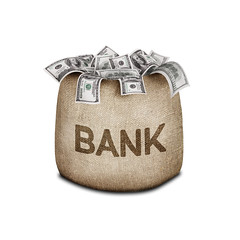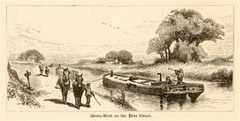Key events and terms for mastery of the time period 1800-1848
| 7743453082 | Era of Good Feelings | A name for President Monroe's two terms, a period of strong nationalism, economic growth, and territorial expansion. Since the Federalist party dissolved after the War of 1812, there was only one political party and no partisan conflicts. |  | 0 |
| 7743453083 | Sectionalism | Different parts of the country developing unique and separate cultures (as the North, South and West). This can lead to conflict. | 1 | |
| 7743453084 | James Monroe | The fifth president of the United States. His administration was marked by the acquisition of Florida (1819); the Missouri Compromise (1820), in which Missouri was declared a slave state; and the profession of the Monroe Doctrine (1823), declaring U.S. opposition to European interference in the Americas. |  | 2 |
| 7743453085 | Nationalism | A devotion to the interests and culture of one's nation. | 3 | |
| 7743453086 | tariff | A tax on imported goods | 4 | |
| 7743453088 | Henry Clay | Senator who persuaded Congress to accept the Missouri Compromise, which admitted Maine into the Union as a free state, and Missouri as a slave state. |  | 5 |
| 7743453089 | American System | An economic regime pioneered by Henry Clay which created a high tariff to support internal improvements such as road-building. This approach was intended to allow the United States to grow and prosper by themselves This would eventually help America industrialize and become an economic power. | 6 | |
| 7743453090 | Second Bank of the US | States resent the main role of banks (present a state's bank notes for redemption that can easily ruin a bank). Thought banks didn't agree with local needs. Nicholas Biddle was president. |  | 7 |
| 7743453092 | John Marshall | 1755-1835. U.S. Chief Supreme Court Justice. Oversaw over 1000 decisions, including Marbury v Madison and McCulloch v. Maryland. |  | 8 |
| 7743453093 | Marbury v Madison | (1803) Marbury was a midnight appointee of the Adams administration and sued Madison for commission. Chief Justice Marshall said the law that gave the courts the power to rule over this issue was unconstitutional. established judicial review |  | 9 |
| 7743453094 | McCulloch v Maryland | Maryland was trying to tax the national bank and Supreme Court ruled that federal law was stronger than the state law |  | 10 |
| 7743453096 | Worcester v Georgia | A case in which the United States Supreme Court vacated the conviction of Samuel Worcester and held that the Georgia criminal statute that prohibited non-Indians from being present on Indian lands without a license from the state was unconstitutional. |  | 11 |
| 7743453099 | Missouri Compromise of 1820 | Allowed Missouri to enter the union as a slave state, Maine to enter the union as a free state, prohibited slavery north of latitude 36˚ 30' within the Louisiana Territory | 12 | |
| 7743453100 | Rush-Bagot Treaty | 1817 - This treaty between the U.S. and Great Britain (which controlled Canada) provided for the mutual disarmament of the Great Lakes. This was later expanded into an unarmed Canada/U.S. border. |  | 13 |
| 7743453102 | Adams Onis Treaty | 1819. Settled land dispute between Spain and United States as a result of tensions brought on by weakening Spanish power in the New World. U.S. gained Florida in exchange for $5 million and renounced any claims on Texas and settled boundary between two countries to the Pacific Ocean. |  | 14 |
| 7743453103 | Monroe Doctrine | 1823, 1823 - Declared that Europe should not interfere in the affairs of the Western Hemisphere and that any attempt at interference by a European power would be seen as a threat to the U.S. It also declared that a New World colony which has gained independence may not be recolonized by Europe. (It was written at a time when many South American nations were gaining independence). Only England, in particular George Canning, supported the Monroe Doctrine. Mostly just a show of nationalism, the doctrine had no major impact until later in the 1800s. |  | 15 |
| 7743453104 | National Road | First national road building project funded by Congress. It made travel and transportation of goods much easier because it was one continuous road that was in good condition. |  | 16 |
| 7743453106 | Erie Canal | A canal between the New York cities of Albany and Buffalo, completed in 1825. The canal, considered a marvel of the modern world at the time, allowed western farmers to ship surplus crops to sell in the North and allowed northern manufacturers to ship finished goods to sell in the West. Connected Great Lakes farms and western markets with New York City leading to its rise as a center of trade and commerce. |  | 17 |
| 7743453107 | Steamboat | A boat powered by a steam engine that turns a large paddle wheel. |  | 18 |
| 7743453108 | Eli Whitney | An American inventor who developed the cotton gin. Also contributed to the concept of interchangeable parts that were exactly alike and easily assembled or exchanged |  | 19 |
| 7743453109 | Interchangeable parts | 1799-1800 - Eli Whitney developed a manufacturing system which uses standardized parts which are all identical and thus, interchangeable. Before this, each part of a given device had been designed only for that one device; if a single piece of the device broke, it was difficult or impossible to replace. With standardized parts, it was easy to get a replacement part from the manufacturer. Whitney first put used standardized parts to make muskets for the U.S. government. |  | 20 |
| 7743453113 | Market Revolution | Dramatic increase between 1820 and 1850 in the exchange of goods and services in market transactions. Resulted from thee combo impact of the increased output of farms and factories, the entrepreneurial activities of traders and merchants, and the development of a transportation network of roads, canals and railroads. |  | 21 |
| 7743453114 | Thomas Jefferson | Virginian, architect, author, governor, and president. Lived at Monticello. Wrote the Declaration of Independence. Second governor of Virginia. Third president of the United States. Designed the buildings of the University of Virginia. Purchased Louisiana for the US even though the purchase was outside of his belief in strict construction of the Constitution. |  | 22 |
| 7743453115 | Embargo Act of 1807 | This act issued by Jefferson forbade American trading ships from leaving the U.S. It was meant to force Britain and France to change their policies towards neutral vessels by depriving them of American trade. It was difficult to enforce because it was opposed by merchants and everyone else whose livelihood depended upon international trade. It also hurt the national economy, so it was replaced by the Non-Intercourse Act. |  | 23 |
| 7743453116 | War of 1812 | A war (1812-1814) between the United States and England which was trying to interfere with American trade with France. Caused by impressment of American sailors, British aid to Indians in the west with firearms, War Hawk Congressman wanted to invade Canada, and continued British interference with trade. |  | 24 |
| 7743453117 | Battle of New Orleans | A battle during the War of 1812 where the British army attempted to take New Orleans. Due to the foolish frontal attack, Jackson defeated them, which gave him an enormous popularity boost. |  | 25 |
| 7743453118 | Treaty of Ghent | December 24, 1814 - Ended the War of 1812 and restored the status quo. For the most part, territory captured in the war was returned to the original owner. It also set up a commission to determine the disputed Canada/U.S. border. The important result of the War of 1812 was that the US maintained its independence from Great Britain. |  | 26 |
| 7743453119 | Lewis and Clark | Sent on an expedition by Jefferson to gather information on the United States' new land and map a route to the Pacific. They kept very careful maps and records of this new land acquired from the Louisiana Purchase. |  | 27 |
| 7743453120 | Sacajawea | The Native American woman who was the personal guide and translator for Lewis and Clark and their expedition in northern Louisiana Territory |  | 28 |
| 7743453121 | Louisiana Purchase | In 1803, the purchase of the Louisiana territory from France. Made by Jefferson, this doubled the size of the US. |  | 29 |
| 7743453122 | James Madison | (1809-1813) and (1813-1817) The War of 1812, the US declares war on Great Britain. In 1814, the British (technically the Canadians) set fire to the Capitol. The Treaty of Ghent ends the war in 1814., The fourth President of the United States (1809-1817). A member of the Continental Congress (1780-1783) and the Constitutional Convention (1787), he strongly supported ratification of the Constitution and was a contributor to The Federalist Papers (1787-1788), which argued the effectiveness of the proposed constitution. Favored strict interpretation of the Constitution. |  | 30 |
| 7743453123 | Non-Intercourse Act | 1809 - Replaced the Embargo of 1807. Unlike the Embargo, which forbade American trade with all foreign nations, this act only forbade trade with France and Britain. It did not succeed in changing British or French policy towards neutral ships, so it was replaced by Macon's Bill No. 2. |  | 31 |
| 7743453126 | Haitian Revolution | A major influence of the Latin American revolutions because of its success; the only successful slave revolt in history; it is led by Toussaint L'Overture. |  | 32 |
| 7743453127 | Revolution of 1800 | Jefferson's view of his election to presidency. Jefferson claimed that the election of 1800 represented a return to what he considered the original spirit of the Revolution. Jefferson's goals for his revolution were to restore the republican experiment, check the growth of government power, and to halt the decay of virtue that had set in under Federalist rule. |  | 33 |
| 7743453128 | Barbary Pirate Wars | The Barbary Wars (or Tripolitan Wars) were two wars between the United States of America and Barbary States in North Africa in the early 19th century. At issue was the pirates' demand of tribute from American merchant vessels in the Mediterranean Sea. American naval power attacked the pirate cities and extracted concessions of fair passage from their rulers. |  | 34 |
| 7743453129 | Tecumseh | A Shawnee chief who, along with his brother, Tenskwatawa, a religious leader known as The Prophet, worked to unite the Northwestern Indian tribes. The league of tribes was defeated by an American army led by William Henry Harrison at the Battle of Tippecanoe in 1811. Tecumseh was killed fighting for the British during the War of 1812 at the Battle of the Thames in 1813. |  | 35 |

